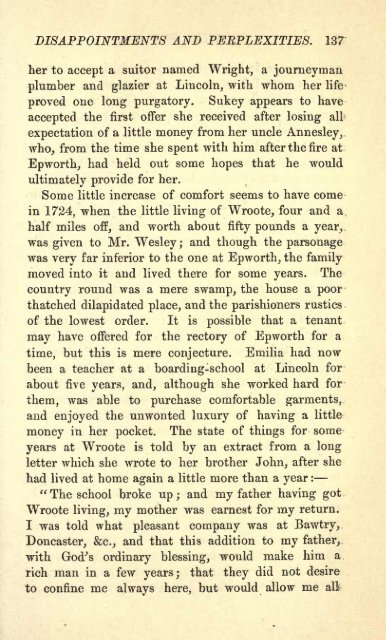Susanna Wesley
This is the story of Susanna Wesley, 1669-1742 Mother of Charles and John Wesley, who were founders of the Methodist Church. Susanna and her husband, Samuel, had nineteen children, ten of whom survived to adulthood. Her son Charles became a well-known hymn writer and her son John became the found of Methodism. Susanna was brought up in a Puritan home as the youngest of twenty-five children. As a teenager, she became a member of the Church of England. She became the wife of a chronically debt-ridden parish rector in an English village. She said, "I have had a large experience of what the world calls adverse fortune." Nonetheless, Susanna managed to pass down to her children Christian principles that stayed with them.
This is the story of Susanna Wesley, 1669-1742 Mother of Charles and John Wesley, who were founders of the Methodist Church. Susanna and her husband, Samuel, had nineteen children, ten of whom survived to adulthood. Her son Charles became a well-known hymn writer and her son John became the found of Methodism.
Susanna was brought up in a Puritan home as the youngest of twenty-five children. As a teenager, she became a member of the Church of England. She became the wife of a chronically debt-ridden parish rector in an English village. She said, "I have had a large experience of what the world calls adverse fortune." Nonetheless, Susanna managed to pass down to her children Christian principles that stayed with them.
Create successful ePaper yourself
Turn your PDF publications into a flip-book with our unique Google optimized e-Paper software.
DISAPPOINTMENTS AND PERPLEXITIES. 137<br />
her to accept a suitor named Wright, a journeyman<br />
plumber and glazier at Lincoln, with whom her life<br />
proved one long purgatory. Sukey appears<br />
to have<br />
accepted the first offer she received after losing all<br />
expectation of a little money from her uncle Annesley,<br />
who, from the time she spent with him after the fire at<br />
Epworth, had held out some hopes that he would<br />
ultimately provide for her.<br />
Some little increase of comfort seems to have come<br />
in 1724, when the little living of Wroote, four and a.<br />
half miles off, and worth about fifty pounds a year,<br />
was given to Mr. <strong>Wesley</strong> and<br />
; though the parsonage<br />
was very far inferior to the one at Epworth, the family<br />
moved into it and lived there for some years. The<br />
country round was a mere swamp, the house a poor<br />
thatched dilapidated place, and the parishioners rustics<br />
of the lowest order. It is possible<br />
that a tenant<br />
may have offered for the rectory of Epworth for a<br />
time, but this is mere conjecture. Emilia had now<br />
been a teacher at a boarding-school at Lincoln for<br />
about five years, and, although she worked hard for<br />
them, was able to purchase comfortable garments,<br />
and enjoyed the unwonted luxury of having a little<br />
money in her pocket. The state of things for some<br />
years at Wroote is told by an extract from a long<br />
letter which she wrote to her brother John, after she<br />
had lived at home again a little more than a year :<br />
" The school broke up and<br />
; my father having got<br />
Wroote living, my mother was earnest for my return.<br />
I was told what pleasant company was at Bawtry,<br />
Doncaster, &c., and that this addition to my father,<br />
with God's ordinary blessing, would make him a<br />
rich man in a few years; that they<br />
did not desire<br />
to confine me always here, but would allow me all

















